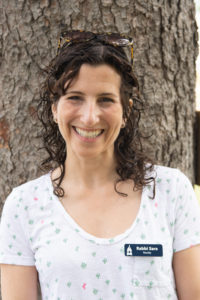On Recognizing the Broken and Beautiful
On a recent, sun-soaked morning here at camp, we gathered in the outdoor sanctuary for tefillah. As the layered harmonies filled the sacred space with boundless beauty and elation, I was struck by the words of one particular prayer:
“I thank you for my life, body and soul. Help me realize, I am beautiful and whole. I’m perfect the way I am, and a little broken too. I will live each day as a gift I give to you.” (Dan Nichols, Asher Yatzar)
This blessing, a creative translation of “Asher Yatzar,” is one of radical gratitude, a paean of thanks to God for the totality of our lives, good and bad, beautiful and broken, perfect and imperfect, too. Watching the campers and counselors, bodies in motion, with voices aimed straight at the heavens, sing and dance this prayer, filled my heart with joy.
This week, Crane Lake has been focusing on the Jewish value called hakarat hatov, or gratitude. The literal translation of hakarat hatov, however, is “recognizing the good.” Gratitude comes not only from our hearts, but also from a precise action, the exercise of trying to see the good in the world around us. No matter what our circumstance, no matter how challenging our environment, the task to seek out the good does not change.
As I reflected on the Asher Yatzar prayer, I marveled at the complexity of the message, and how wonderfully it captured the value of hakarat hatov. For the words of the song ask us to be grateful not only for that which is beautiful and whole in our lives, but also, that which is broken, too. The song goes on to say that the entirety of our lives, good and bad, is a gift we lovingly share with God.
It’s not easy to be grateful for the things that make us “broken,” for our frailties, or our blemishes, our foibles, or our inadequacies. The very act of admitting to our weaknesses is a challenge in and of itself. Yet it is these vulnerabilities that make us human, that make us relatable to one another, that make us understand pain and heartache and sadness and yearning. And in a world that so often touts perfection as the ultimate goal, the message to embrace our imperfections, and be grateful for them, is absolutely critical, not only for our campers, but for all of us.
One of the reasons Crane Lake is so special is because our campers are encouraged to be themselves, and not just part of themselves, but their whole selves, flaws and faults and vulnerabilities and all. There’s no such thing as the “perfect” camper; there’s not one singular way to succeed at camp. And sometimes, many times, success at camp is defined by failure, defined by the willingness to take a risk and lose, or the readiness to try something new and fall short. Time and again we learn, in the space between trying and faltering, there is infinite room for growth.
Jewish tradition teaches: If a commoner uses a broken vessel, it’s considered a disgrace. But not God, for all of God’s vessels are broken. Just as we sing in Asher Yatzar, “I’m perfect the way I am, and a little broken too,” may we all find reasons to be grateful for every part of us, and for every broken other too.
Rabbi Sara Y. Sapadin currently serves Congregation Emanu-El of the City of New York as an Associate Rabbi.

